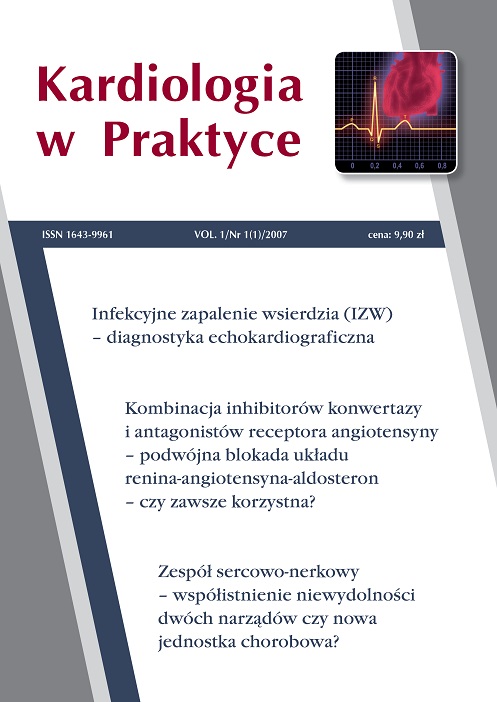Zespół sercowo-nerkowy – współistnienie niewydolności dwóch narządów czy nowa jednostka chorobowa? Artykuł przeglądowy
##plugins.themes.bootstrap3.article.main##
Abstrakt
Niezależnie od przyczyny wywołującej, nawet niewielkie zmniejszenie przesączania kłębuszkowego (GFR) wskazuje na rosnące ryzyko sercowo-naczyniowe. Upośledzenie czynności nerek w populacji pacjentów z niewydolnością serca jest powszechnym i ważnym czynnikiem predykcyjnym zwiększonej śmiertelności. Pacjenci hospitalizowani z powodu zaostrzenia niewydolności serca zwykle demonstrują równoczesne zaostrzenie niewydolności nerek. Analogicznie do terminu „zespół wątrobowo-nerkowy”, można pokusić się o rozpoznanie „zespołu sercowo-nerkowego”. Zespół sercowo-nerkowy przejawia się pogorszeniem niewydolności serca i niewydolności nerek, prowadzi do oporności na leczenie moczopędne, przewodnienia i dalszego pogorszenia niewydolności serca. Zwraca się uwagę na chwiejną współzależność upośledzonej w znacznym stopniu funkcji obu narządów. Z definicji zespół sercowo-nerkowy to coś więcej niż współistnienie niewydolności nerek i niewydolności serca. Zaplanowanie właściwego postępowania terapeutycznego z uwzględnieniem wpływu na poprawę funkcji nerek może przyczynić się do poprawy rokowania u pacjentów z niewydolnością serca.
Pobrania
##plugins.themes.bootstrap3.article.details##

Utwór dostępny jest na licencji Creative Commons Uznanie autorstwa – Użycie niekomercyjne – Bez utworów zależnych 4.0 Międzynarodowe.
Copyright: © Medical Education sp. z o.o. This is an Open Access article distributed under the terms of the Attribution-NonCommercial 4.0 International (CC BY-NC 4.0). License (https://creativecommons.org/licenses/by-nc/4.0/), allowing third parties to copy and redistribute the material in any medium or format and to remix, transform, and build upon the material, provided the original work is properly cited and states its license.
Address reprint requests to: Medical Education, Marcin Kuźma (marcin.kuzma@mededu.pl)
Bibliografia
2. Emerman C.L.: Treatment of the acute decompensation of heart failure: efficacy and pharmacoeconomics of early initiation of therapy in the emergency department. Rev Cardiovasc Med 2003, VOL 4 Suppl 7, S13-20.
3. Butler J., Forman D.E., Abraham W.T. et al.: Relationship between heart failure treatment and development of worsening renal function among hospitalized patients. Am Heart J 2004, 147(2).
4. van Kimmenade R.R., Januzzi J.L. Jr, Baggish A.L.: Amino-terminal pro-BNP and renal impairment both predict death in patients with heart failure. J Am Coll Cardiol 2006, 48(8), 1621-7.
5. Forman D.E., Butler J., Wang Y., Abraham W.T., O’Connor C.M., Gottlieb S.S., Loh E., Massie B.M., Rich M.W., Stevenson L.W., Young J.B., Krumholz H.M.: Incidence, predictors at admission, and impact of worsening renal function among patients hospitalized with heart failure. J Am Coll Cardiol 2004; 43, 61-67.
6. Francis G.S.: Pathophysiology of chronic heart failure. American Journal of Medicine 2001,110, Suppl 7A.
7. Shibagaki Y., Tai C., Nayak A., Wahba I.: Intra-abdominal hypertension is an under-appreciated cause of acute renal failure. Nephrol Dial Transplant 2006, 21(12), 3567-3570.
8. Doty J.M., Saggi B.H., Blocher C.R. et al.: Effects of increased renal parenchymal pressure on renal function. J Trauma 2000, 48, 874-877.
9. Isles C.: Cardiorenal failure. Pathophysiology, recognition and treatment. Clin Med 2002, 2, 195-200.
10. Luft F.C.: Hypertensive nephrosclerosis – a cause of end stage renal disease? Nephrol Dial Transplant 2000, 15, 1515-1517.
11. Weinfeld M.S., Chertow G.M., Warner Stevenson L.: Aggravated renal dysfunction during intensive therapy for advanced chronic heart failure Am Heart J 1999, 138, 285-90.
12. Chen H.H., Redfield M.M., Nordstrom L.J., Cataliotti A., Burnett Jr J.C.: Angiotensin II AT1 receptor antagonism prevents detrimental renal actions of acute diuretic therapy in human heart failure. Am J Physiol Renal Physiol 2003, 284, F1115-F1119.
13. Salvador D., Rey N., Ramos G. et al.: Continuous infusion versus bolus injection of loop diuretics in congestive heart failure. Cochrane Database Syst Rev 2004, 1, CD003178.
14. Licata G., Di Pasquale P., Parrinello G. et al.: Effects of high-dose furosemide and small-volume hypertonic saline infusion in comparison with a high dose furosemide as bolus in refractory congestive heart failure: long-term effects. Am Heart J 2003, 145, 459-466.
15. The PRAISE investigators Neuberg G.W., Miller A.B., O’Connor C.M. et al.: Diuretic resistance predicts mortality in patients with advanced heart failure. Am Heart J 2002,144, 31-38.
16. Butler J., Emerman C., Peacock W.F., Mathur V.S., Young J.B. on behalf of the VMAC Study Investigators. The efficacy and safety of B-type natriuretic peptide (nesiritide) in patients with renal insufficiency and acutely decompensated congestive heart failure. Nephrol Dialy Transplant 2004, 19, 391-399.
17. Sackner-Bernstein J.D., Skopicki H.A., Aaronson K.D.: Risk of worsening renal function with nesiritide in patients with acutely decompensated heart failure. Circulation 2005, 111, 1487-1491.
18. Ungar A., Fumagalli S., Marini M. et al.: Renal, but not systemic, hemodynamic effects of dopamine are influenced by severity of congestive heart failure. Crit Care Med 2004, 32, 1125-1129.
19. Varriale P., Mossavi A.: The benefit of low-dose dopamine during vigorous diuresis for congestive heart failure associated with renal insufficiency: Does it protect renal function? Clin Cardiol 1997, 20, 627-630.
20. Vargo D.L., Brater D.C., Rudy D.W. et al.: Dopamine does not enhance furosemide-induced natriuresis in patients with congestive heart failure. J Am Soc Nephrol 1996, 7, 1032-1037.
21. Sharma A., Hermann D.D., Mehta R.L.: Clinical benefit and approach of ultrafiltration in acute heart failure. Cardiology 2001, 96, 144-154.
22. Jaski B.E., Ha J., Dentys B.G. et al.: Peripherally inserted veno-venous ultrafiltration for rapid treatment of volume overloaded patients. J Card Fail 2003, 9, 227-31.
23. Costanzo M.R. for the UNLOAD Investigators. Late-Breaking Clinical Trial presented at the 2006 American College of Cardiology Scientific 55th Annual Scientific Session. Ultrafiltration versus intravenous diuretics for patients hospitalized for acute decompensated heart failure. March 11-14, 2006. Atlanta, Georgia.
24. Kagan A., Rapoport J.: The role of peritoneal dialysis in the treatment of refractory heart failure Nephrology Dialysis Transplantation 2005, 20(Supplement 7), vii28-vii31.
25. Levey A.S.: Assessing the effectivness of therapy to prevent the progression of renal disease. Am J Kidney Dis 1993, 22(1), 207-14.
26. Jie K.M., Verhaar M.C., Cramer M.J. et al.: Erythropoietin and the cardiorenal syndrome: cellular mechanisms on the cardiorenal connectors. Am J Physiol Renal Physiol 2006, 291, F932-F944.
